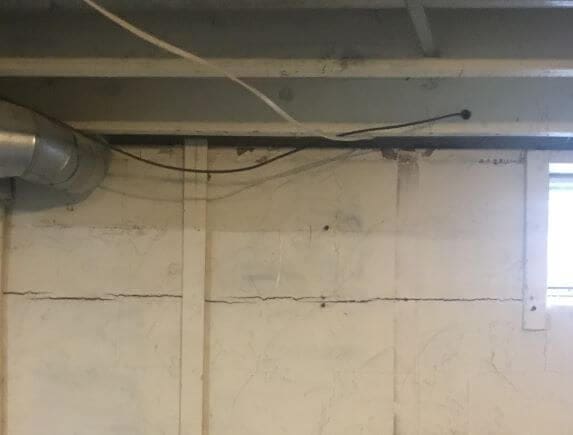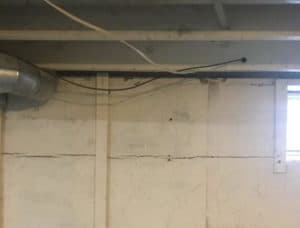
Originally posted 10/22/2018, updated 2/18/2021
The phrase, “adulting is hard,'' began as a lament for young adults who dreaded the mundane aspects of adulthood. But I think it speaks to all of us when we’re tackling unpleasant tasks like filing taxes or visiting our in-laws. There are just some times you’d really prefer to dodge your responsibilities.
Foundation repair is often another example. We’d much prefer to spend money on more visible home improvements like remodeling a bathroom, and turn a blind eye to the crack in the wall or dampness in the basement corner. But your home is most likely the single largest investment you have, both literally and financially. Procrastination will not protect that investment, and can actually do substantial harm.
Acculevel is a repair company that specializes in foundation repair and waterproofing. Since his start in 1996, Andy Beery and his family company have helped over thirty thousand homeowners. We don’t just repair wall cracks or dry out basements; we restore stability and health to houses, providing peace of mind and securing resale value.
In this article, we’ll explain three major reasons you should repair foundation issues promptly and provide resources to help you decide the best course of action for you and your home.
 This photo was taken by an Acculevel project manager during a free estimate appointment. The wall is cracked and bowing.
This photo was taken by an Acculevel project manager during a free estimate appointment. The wall is cracked and bowing.
Foundation issues can have a negative impact on your health and that of your loved ones. Cracks in the foundation can allow water to intrude. This not only causes the cracks to expand over time; water in your basement will lead to mold. Mold can cause health problems for even the healthiest of people, and can cause existing conditions to worsen. This is especially true for anyone with pulmonary (lung) problems, or a compromised immune system.
In fact, a study performed by the American Society of Heating, Refrigerating and Air-Conditioning Engineers demonstrated that viruses and bacteria flourish under extreme humidity levels. As you can see in the chart below, the ideal humidity level for the health of you and your family is right around 50%.

If you regularly have water or heavy moisture in your basement, you should explore waterproofing options. We explain the different types of drainage and their best applications in this article. To combat heavy humidity, we have an article that explores the advantages and requirements for whole house dehumidifiers, here.
I mentioned earlier that cracks have a tendency to expand over time. This doesn’t just increase the potential for water leaks- it can also lead to structural instability. I know that sounds alarmist, but you have to take foundation cracks seriously. Your entire home rests on that foundation, and the overall security of the structure relies on it standing firm.
If you are unsure about the significance of the crack(s) you’ve seen in your home, we have a reference material that illustrates the most common types of cracks and how urgent it is to repair them.
We also have an article that details the symptoms of foundation settling, which occurs when one section settles (lowers) at a different rate than the rest. Settling can cause extensive damage throughout your home: materials like wood and concrete are not flexible. So when they’re pressured by an uneven foundation, you’ll see damage to your doors, windows, flooring, even roof leaks.
Another factor to consider is the cost of repairs will escalate as well. As you’d expect, repairs to hairline cracks are less expensive than bowing walls or settling foundation corners. We dive into the costs of procrastinating home repairs in this blog.
All of the things we’ve discussed here- cracks, dampness, mold- are items that a home inspector is actively looking for during their review of your home. Each flaw that is flagged is a point of negotiation between you and your buyer. That is a hurdle you will struggle to clear, if you choose to sell your home without repairing your foundation first. This will impact your selling price, of course; but it could also have a negative effect on the speed of the sale.
Potential buyers will need to weigh out the pros and cons of buying a home that needs structural repairs. And if your basement smells like mold, or has visible growth? Many of them will move on to the next house on their ‘wish list,’ regardless of how appealing your home may be in other respects.
It is always in your best interests to maintain your home in the best shape possible. But if you don’t know who to contact, or how to find a contractor that’s qualified and trustworthy, that’s another “adulting'' task you have to conquer.
Our detailed checklist of questions to ask a contractor is available to all homeowners, free of charge. It is not limited to foundation repair contractors- you can use it with any home service provider and I strongly suggest doing so. It is an unfortunate reality that every industry has its share of scam artists, and legitimate business owners never want to see anyone taken advantage of.
If you need repairs made to your home, please do your research. Verify the company is reputable, insured, and accredited by the Better Business Bureau. Read the reviews, ask for recommendations from friends, neighbors, etc.
Always get an estimate in writing- and get more than one. Use our checklist, watch for any red flags, and remember that a quality contractor does not ask for full payment up front.
If you live in our service area, contact us. We provide free estimates, and our project managers will answer any questions you have, clearly and honestly. If you have health concerns about an in-person meeting, we will work with you on safe alternatives.
We believe everyone deserves a safe and healthy home, and we want to help you take care of yours.
[DISPLAY_ULTIMATE_SOCIAL_ICONS]